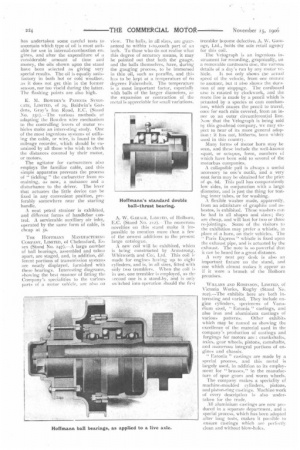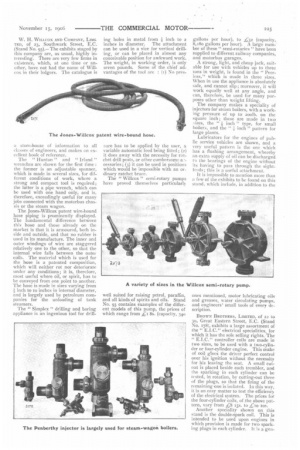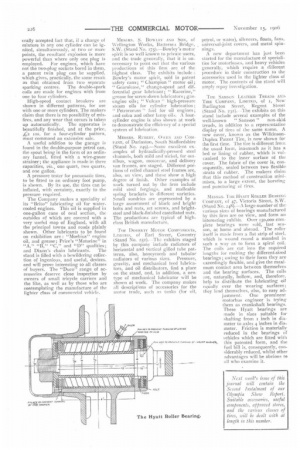THE COMMERCIAL MOTOR has undertaken some careful tests to ascertain
Page 20

Page 21

Page 22

If you've noticed an error in this article please click here to report it so we can fix it.
which type of oil is most suitable for use in internal-combustion engines, and after the expenditure of a considerable amount of time and money, the oils shown upon the stand have been selected as giving very special results. The oil is equally satisfactoryin both hot or cold weather, as it does not get thin in the former season, nor too viscid during the latter. The flashing points are also high.
E. M. BownEN's PATENTS SYNDICATE, LIMITED, of 29, Baldwin's Gardens, Gray's Inn Road, E.C. (Stand No. 251).—The various methods of adapting the Bowden wire mechanism to the controlling levers of motor vehicles make an interesting study. One of the most ingenious systems of utilisMg the cable, or wire, is found in the mileage recorder, which should be examined by all those who wish to check the distances covered by their motor, or motors.
The agitator for carburetters also employs the familiar cable, and this simple apparatus prevents the process of " tickling " the carburetter from remaining, as now, a nuisance and a disturbance to the driver. The lever that actuates the little device can be fixed in any convenient position, preferably somewhere near the starting handle.
A neat petrol strainer is exhibited, and different forms of handlebar control. A serviceable auxiliary air inlet, operated by the same form of cable, is cheap al js.
THE HOFFMANN MANUFACTURINi. COMPANY, LIMITED, of Chelmsford, Essex (Stand No. 247).—.A large number of hall bearings, assembled and taken apart, are staged, and, in addition, dif. ferent portions of transmission systems are neatly displayed, furnished with these bearings. Interesting diagrams, showing the best manner of fitting the Company's specialities to the various parts of a motor vehicle, are also 011
view. The balls, in all sizes, are guaranteed to within i-to,ocoth part of an inch. To those who do not realise what this degree of accuracy means, it may be pointed out that both the gauge, and the halls themselves, have, during the gauging process, to be immersed in thin oil, such as paraffin, and this has to be kepi at a temperature of no degrees Fahrenheit. The temperature is a most important factor, especially with balls of the larger diameters, as the expansion or contraction of the metal is appreciable for small variations.
A. W. GAMAI.E. LIMITED, of Holborn, E.C. (Stand No. 2 1 2). — The numerous novelties on ihis stand make it impossible to mention more than a few of the newest additions to the present large catalogue.
A new coil will be exhibited, whicii is being constructed by Armstrong, Whitworth and Co:, Ltd. This coil is made for engines having up to eight cylinders, and is, in all sizes, fitted with only two tremblers. When the coil is in use, one trembler is employml, as the ,econd one is a stand-by, and is only switched into operation should the first trembler become defective. A. W. Gamage, Ltd., holds the sole retail agency fur this coil.
The Velograph is an ingenious instrument for recording, graphically, on a removable cardboaro disc, the various details of a day's run by ally motor ve hicle, IL nut only shows the actual speed of the vehicle, from one minute to anotner, but it also shows the duration of any stoppage. The cardboard uisc is rotated by clockwork, and the route line is made by a pencil which is actuated by a species of cam mechanism, which causes the pencil to travel, once for each mile covered, from an inner to an outer circumferential line. Now that the Velograph is being sold by this go-ahead company, we may expect to hear of its more general adoption it has not, hitherto, been widely used in this comm.) .
Many forms of motor horn may be seen, and these include the well-known squat, or octopus, form, numbers of which have been sold to several of the motorbus companies.
A collapsible pail is always a useful accessory to one's outfit, and a . very neat form may be obtained for die price of 4S. od. 'this pail has comparatively low sides, in conjunction with a large diameter, and is just the thing for testing inner tubes, or for washing.
A flexible washer made, apparently, from an admixture of graphite and asbestos, is exhibited. These washers can be had in all shapes and sizes; they are cheap, and will last for two or three re-jointings. Some of the visitors to the exhibition may prefer a whistle, in place of a horn, on their vehicles. The
Paris Express " whistle is fixed upon the exhaust pipe, and is actuated by the exhaust, The note is so powerful that it can be heard for a great distance.
A very neat pay desk is also au important fixture orr the stand, mid one which almost makes it appear as if it were a branch of the Holborn premises.
WILLANS AND ROBINSON, LIMITED, of Victoria Works, Rugby (Stand No. 2o2).—The exhibits here are both interesting and varied. They include engine cylinders, specimens of Vanadium steel, " Eatonia " castings, and also iron and aluminium castings of various patterns. Other exhibits which may be named as showing the excellence of the material used in the company's production of castings and forgings fur motors arc crankshafts, axles, gear wheels, pistons, camshafts, and numerous integral portions of engines and chassis.
" Eatonia " castings are made by a special process, and this metal is largely used, in addition to its employment for " brasses," in the manufacture of spur gears and worm wheels.
The company makes a speciality of machine-moulded cylinders, pistons, and piston-ring castings. Machine work of every description is also undertaken for the trade.
All aluminium castings are now produced in a separate departmem, and a special process, which has been adopted after long tests, makes it poible to ensure castings which are perfectly clean and without blow-holes. W. H. WILLCOX AND COMPANY, DMITRI), Of 23, Southwark Street, E.C. (Stand No. 93).— The exhibits staged by this company are, as usual, highly interesting. There are very few firms in existence, which, at one time or anoilier, have not had the name of Willcox in their ledgers. The catalogue is a store-house of information to all classes of engineers, and makes an excellent book of reference.
The " Hunton " and " Wand " wrenches are shown for the first time : the former is an adjustable spanner, which is made in several sizes, for different conditions of work, where a strong and compact tool is required; the latter is a pipe wrench, which can be used with one hand only, and is, therefore, exceedingly useful for many jobs connected with the motorbus chassis or the steam wagon.
The Jones-Willcox patent wire-bound hose piping is prominently displayed. The fundamental difference between this hose and those already on the market is that it is armoured, both inside and outside, and that no rubber is used in its manufacture. The inner and outer windings of wire are staggered relatively one to the other, so that the internal wire falls between the outet coils. The material which is used for the hose is a patented composition, which will neither rot nor deteriorate under any conditions ; it is, therefore, most useful where oil, or spirit, has to be conveyed from one point to another. The hose is made in sizes varying from 3. inch to to inches in internal diameter, and is largely used by petroleum companies for the unloading of tank steamers.
The " Simplex " drilling and boring appliance is an ingenious tool for drill ing holes in metal from inch to 2
inches in diameter. The attachment can be used in a vice for vertical drilling, or can be placed in almost any conceivable position for awkward work. The weight, in working order, is only seven pounds. Some of the chief advantages of the tool are : (I) No pre.s
sure has to be applied by the user, a variable automatic feed being fitted; (2) it does away with the necessity for ratchet drill posts, or other cumbersome a:cessories ; (3) it can be used in positions which would be impossible with an ordinary ratchet brace.
The " Willcox " semi-rotary pumps have proved themselves particularly well suited for raising petrol, paraffin, and all kinds of spirits and oils. Stand No. 93 contains examples of the different models of this pump, the prices of which range from 41 8s. (capacity, 340 gallons per hour), to £32 (capacity, 8,18o gallons per hour). A Large number of these " semi-rotaries " have been supplied to different railway companies, and motorbus garages.
A strong, light, and cheap jack, suitable for use with vehicles up to three tons in weight, is found in the " Peerless," which is made in three sizes. When in use the appliance is absolutely safe, and cannot slip; moreover, it will work equally well at any angle, and can, therefore, be used for many purposes other than weight lifting.
The company makes a speciality of injectors for steam boilers, with a working pressure of up to 200lb. on the square inch; these are made in two :iizes, the " 14 inch " type, for small boilers, and the " inch " pattern for large plants.
Lubricators for the engines of public service vehicles are shown, and a very useful pattern is the one which has a flushing arrangement, whereby an extra supply of oil can be discharged t') the bearings of the engine without its having to pass through the sightfeeds; this is a useful attachment.
It is impossible to mention more than it few of the exhibits to be found on this stand, which include, in addition to the ones mentioned, motor lubricating oils and greases, water circulating pumps, and engineers' small tools of every description.
BROWN BROTHERS, LIMITED, of 22 to 30, Great Eastern Street, EC. (Stand No. 178), exhibits a large assortment of the " E.I.C." electrical specialities, for which it has the sole selling rights. The " E.I.C." controller coils are made in two sizes, to be used with a two-cylinder or four-cylinder engine. This make of coil gives the driver perfect control over his ignition without the necessity for his leaving the seat. A small cutout is placed beside each trembler, and the sparking in each cylinder can be tested, in rotation, by cutting-out three of the plugs, so that the firing of the remaining one is isolated. In this way, it is an easy matter to test the efficiency of the electrical system. The prices for the four-cylinder coils, of the above pattern, vary from £8 1,5s. to ,4:to los.
Another speciality shown on this stand is the double-spark coil. This is intended to be used upon engines in which provision is made for two sparking plugs in each cylinder. It is a gen
erally accepted fact that, if a charge of mixture in any one cylinder can be ignited, simultaneously, at two or more points, the resultant exposion is more powerful than where only one plug is employed. For engines, which have not the two-plug sockets bored in them, a patent twin plug can be supplied, which gives, practically, the same result as that obtained from two separate
sparking centres. The double-spark coils are made for engines with from one to four cylinders.
High-speed contact breakers are shown in different patterns, for use with one or more cylinders. The makers claim that there is no possibility of misfires, and any wear that occurs is taken
up automatically. The apparatus is beautifully finished, and at the price, 4'2 los. for a four-cylinder pattern, must command an extensive sale.
A useful addition to the garage is found in the double-purpose petrol can, the spout being in the form of an ordinary funnel, fitted with a wire-gauze strainer ; the appliance is made in three capacities, viz., one quart, two quarts, and one gallon.
A pressure tester for pneumatic tires, to be fitted to an ordinary foot pump, is shown. By its use, the tires can be inflated, with certainty, exactly to the pressure required.
The Company makes a speciality of its "Brito" lubricating oil for watercooled engines. This oil is supplied in one-gallon cans of oval section, the outsides of which are covered with a very useful map of England, with all the principal towns and roads plainly shown. Other lubricants to be found on exhibition are : "Moebius" engine oil, and grease; Price's "Motorine" in "A," "B," "C," and "D" qualities ; and Dixon's chain lubricants. The stand is filled with a bewildering collection of ingenious, and useful, devices, and will prove interesting to all classes of buyers. The "Duco" range of accessories deserve close inspection by owners of small tricycle carriers and the like, as well as by those who are contemplating the manufacture of the lighter class of commercial vehicl
MESSRS. S. BOWLEY AND SON, Of Wellington Works, Battersea Bridge, S.W. (Stand No. 175).—Bowley's motor spirit is so well known to private users, and the trade generally, that it is unnecessary to point out that the various productions of this firm are of the highest class. The exhibits include : Bowley's motor spirit, sold in patent safety cans; " Champion " motor oil; " Gearolcase," change-speed and differential gear lubricant ; " Racerine," grease for screw-down lubricators; gasengine oils; " Vulcan " high-pressure steam oils for cylinder lubrication ; " Petrororuss '' fuel for oil engines; told colza and other lamp oils. A fourcylinder engine is also shown at work to demonstrate the efficiency of a special system of lubrication.
MESSRS. RUBERY, OWEN AND COMPANY, of Darlaston, South Staffordshire (Stand No. 249).—Some excellent examples of hydraulically-pressed steel channels, both mild and nickel, for omnibus, wagon, motorcar, and delivery van frames, are staged. Different portions of rolled channel steel frames arc, also, on view, and these show a high degree of finish. Other examples of work turned out by the firm include mild steel forgings, and malleable spring brackets in different varieties. Small sundries are represented by a large assortment of black and bright bolts and nuts, set screws, and brightsteel and black-finished castellated nuts. The productions are typical of highclass British manufacture.
TUE DOHERTY MOTOR COMPONENTS,
1,1mrrEu, of Earl Street, Coventry (Stand No. 252).--The exhibits staged by this company include radiators of horizontal and vertical gilled tube patterns, also, honeycomb and tubular radiators of various sizes. Pressure, gravity, and mechanical teed lubricators, and oil distributors, find a place on the stand, and, in addition, a new type of mechanical lubricator will be shown at work. The company makes all descriptions of accessories for the motor trade, such as tanks (for oil,
petrol, or water), silencers, floats, fans, universal-joint covers, and metal spinflings.
A new department has just been started for the manufacture of specialities for motorbuses, and heavy vehicles generally, which require a different procedure in their construction to the accessories used in the lighter class of motor. The contents of the stand will amply repay investigation.
THE SAMSON LEATHER TREADS AND, TIRE COMPANY, LIMITED, Of I , New Burlington Street, Regent Street (Stand No. 232). The exhibits on this stand include several examples of the
well-known " Samson " non-skid treads, in addition to a representative display of tires of the same name. A new cover, known as the WilkinsonDuplex Patent Tire, is now shown for the first time. The tire is different front the usual form, inasmuch as it has a bed or lining of rubber, which is vulcanised to the inner surface of the cover. The fabric of the cover is, consequently, sealed between two flexiblestrata of rubber. The makers claim. that this method of construction minimises, to a large extent, the bursting and puncturing of tires.
MESSRS. .1 H YAW ROLLER BEARING. C OMPANY, Of 47, Victoria Street, S.W. (Stand No. 248)..—A large number of the various sizes of bearings manufactured by this firm are on view, and form an interesting exhibit. Over 25o,000 complete bearings were sold, last season, at home and abroad. The roller itself is made from a flat strip of steel._ which is wound round a mandrel in such a way as to form a spiral coil. The coils are cut into the required. lengths for making the different-sized bearings ; owing to their form they are exceedingly flexible, and give the maximum contact area between themselves and the bearing surfaces. The coils are, naturally, hollow, and, therefore, help to distribute the lubricating oil equally over the wearing surfaces; they lend themselves, also, to easy ad
justment. One prominent motorbus engineer is trying them as crankshaft bearings. These Hyatt bearings are made in sizes suitable for
shafting from inch in diameter to axles 4 inches in diameter. Friction is materially reduced in the bearings of vehicles which are fitted with
this patented form, and the Fuel bill is, consequently, considerably reduced, whilst other advantages will be obvious to all who examine it.


























